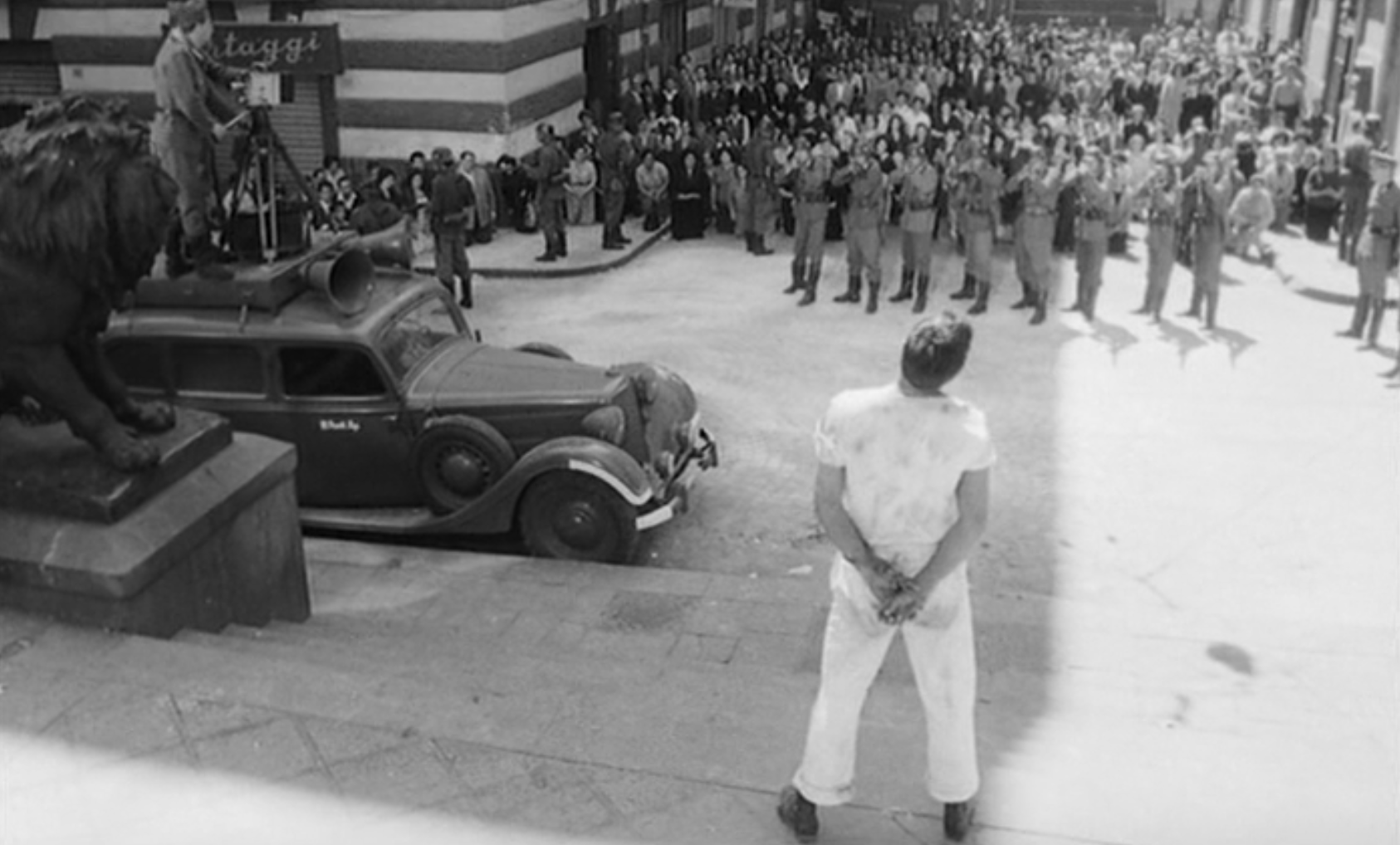Regia / Director: Nanni Loy, 1962
I soldati italiani corrono tra le macerie e si nascondono in cima a un'altura. Sotto vedono passare le jeep tedesche. Per il momento sono al sicuro.
Italian soldiers run through the rubble and hide at the top of a rise. Below, they see German jeeps go by. For the moment, they are safe.
"E adesso che facciamo?" chiede l'ufficiale.
Arriva la risposta: "Tenente, perché guarda me?"
“What do we do now?” asks the officer.
Comes the response: “Lieutenant, why are you looking at me?”
Il tenente si alza e si toglie rapidamente l'uniforme. Gli altri seguono l'esempio. Seppelliscono le armi.
Uno slogan fascista sul lato di un edificio dice: "Meno case, più onore". *
Questo slogan – "Meno case, più onore" – sembra essere collegato al più famoso slogan fascista "Molti nemici, molto onore".
The lieutenant stands and quickly takes off his uniform. The others follow suit. They bury their weapons.
A Fascist slogan on the side of a building says: “Fewer houses; more honor.”
This slogan – “Fewer houses, more honor” – seems to be related to the more famous Fascist slogan “Many enemies, much honor.”
Nel centro della città, il marinaio è tenuto prigioniero, mentre una folla di italiani lo guarda. Un ufficiale tedesco, con le mani sui fianchi, guarda una fila di soldati: il plotone di esecuzione.
In the city center, the sailor is held captive, as a crowd of Italians look on. A German officer, hands on his hips, looks over at a row of soldiers: the firing squad.
Attraverso un microfono, un ufficiale fascita in abito bianco e cappello – probabilmente il sindaco – traduce le dichiarazioni degli invasori: "Questo marinaio paga per tutti gli atti di ostilità contro i tedeschi. Questo valga come ammonimento: se altri sconsiderati oseranno, sanno ora a quale sanzione andranno incontro".
Through a microphone, a Fascist official in a white suit and hat – likely the Mayor – translates the invaders’ statements: “This sailor is paying for all hostile acts against the Germans. This serves as a warning: if other reckless people dare, now they know what penalty they will face.”
Vediamo che si trovano davanti all’Accademia di Belle Arti di Napoli, con due leoni che fiancheggiano la porta principale.
"E ora tutti in ginocchio, dice il signor Capitano" – ordina il Sindaco – "Voi delle prime file. Tutti dovete vedere". Lentamente, gli astanti obbediscono.
We see that they are in front of the Naples Academy of Fine Arts, two lions flanking the main door.
“And now everyone on your knees, the Captain says,” instructs the Mayor. “You in the first rows. You all have to see.” Slowly, the onlookers obey.
“Il popolo napoletano deve approvare l’esecuzione perciò, dice il signor Capitano, applaudite. Applaudite!”
“It is up to the people of Naples to approve the execution, and so the Captain says that you must applaud. Applaud!”
Nessuno applaude.
"Vi deve filmare il film Luce".* Nessuno si muove.
*Luce – acronimo di L’Unione Cinematografica Educativa – era la casa di produzione della propaganda cinematografica fascista.
No one applauds.
“You have to be filmed for the Luce film.”* No one stirs.
*Luce – acronym for The Educational Film Union – was the Fascist film propaganda production company.
"Ve lo dico per il vostro bene: applaudite! Se no, questi se la prendono anche con voi!"
“I’m telling you for your own good: applaud! If not, they’ll take it out on you too!”
Sorvegliati dai soldati con i fucili, uno dopo l'altro iniziano ad applaudire. Mentre applaude, le lacrime scorrono sulle guance della prostituta che poco prima aveva parlato con il marinaio. Non è l'unica a piangere.
Overseen by soldiers with rifles, one by one they begin to clap. As she applauds, tears run down the cheeks of the prostitute who spoke to the sailor just a little while before. She’s not the only one crying.
Ora applaudono più forte e più velocemente: sembra che stiano offrendo il loro applauso al marinaio.
They clap louder and faster now: they seem to be offering their applause to the sailor.
Il Capitano urla qualcosa in tedesco.
"Non dovete piangere!" implora il Sindaco.
The Captain screams something in German.
“You mustn’t cry!” implores the Mayor.
Poi lui e il Capitano scendono i gradini. Il marinaio viene portato, a fatica, al centro della scala.
Then he and the Captain descend the steps. The sailor is brought, struggling, to the center of the staircase.
Inizia il conteggio per la fucilazione. Lui guarda la folla, in preda all'angoscia.
The count for the firing squad begins. He looks out at the crowd, in anguish.
Con le mani legate dietro la schiena, vestito tutto di bianco, il marinaio* è rivolto verso la folla. I soldati sparano e lui cade di botto sui gradini di pietra.
*Nella vita reale, questo marinaio era Andrea Mansi, 24 anni, di Ravello, arrivato a Napoli ignaro di quello che stava accadendo.
Hands tied behind his back, dressed all in white, the sailor* faces the crowd. The soldiers fire and he falls in a heap on the stone steps.
*In real life, this was 24-year-old Andrea Mansi from Ravello, who arrived in Naples unaware of what was happening.
La folla mormora. Il Capitano abbaia ordini e il plotone d'esecuzione si allontana. Dall'alto, vediamo gli spettatori che si disperdono. A sinistra dell'inquadratura, non toccato dal trambusto, il corpo del soldato è immobile.
The crowd murmurs. The Captain barks orders and the firing squad files away. From above, we see the onlookers disperse. At the left of the frame, untouched by the commotion, the soldier’s body is still.
FINE PARTE 3
Here is Parte 4 of this cineracconto. Subscribe to receive a weekly email newsletter with links to all our new posts.

































